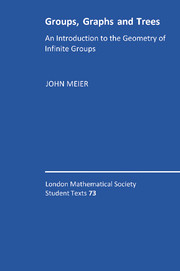Book contents
- Frontmatter
- Contents
- Preface
- 1 Cayley's Theorems
- 2 Groups Generated by Reflections
- 3 Groups Acting on Trees
- 4 Baumslag–Solitar Groups
- 5 Words and Dehn's Word Problem
- 6 A Finitely Generated, Infinite Torsion Group
- 7 Regular Languages and Normal Forms
- 8 The Lamplighter Group
- 9 The Geometry of Infinite Groups
- 10 Thompson's Group
- 11 The Large-Scale Geometry of Groups
- Bibliography
- Index
10 - Thompson's Group
Published online by Cambridge University Press: 05 June 2012
- Frontmatter
- Contents
- Preface
- 1 Cayley's Theorems
- 2 Groups Generated by Reflections
- 3 Groups Acting on Trees
- 4 Baumslag–Solitar Groups
- 5 Words and Dehn's Word Problem
- 6 A Finitely Generated, Infinite Torsion Group
- 7 Regular Languages and Normal Forms
- 8 The Lamplighter Group
- 9 The Geometry of Infinite Groups
- 10 Thompson's Group
- 11 The Large-Scale Geometry of Groups
- Bibliography
- Index
Summary
Thompson's group comes up in many different situations, it has interesting properties, and almost every question you can ask about it is challenging.
–Kenneth S. BrownIn this chapter we introduce another interesting infinite group described in terms of functions from ℝ to ℝ, although in this case we only use the closed interval [0, 1]. We begin by discussing dyadic divisions of [0, 1]. A dyadic division of [0, 1] is constructed by first dividing [0, 1] into [0, 1/2] and [1/2, 1], and then proceeding to “pick middles” of the resulting pieces, a finite number of times. For example,
is a dyadic division. We refer to the points of subdivision as the chosen middles, so in the example above the chosen middles are: 1/2, 3/4 and 5/8 (listed in the order they are chosen). We refer to any interval of the form as a standard dyadic interval. Exercise 1 asks you to show that any time you divide [0, 1] into standard dyadic intervals, you necessarily have a dyadic division of [0, 1].
Dyadic divisions of [0, 1] can be encoded using finite, rooted binary trees. Recall from Chapter 6 that a rooted binary tree is a rooted tree where every non-leaf vertex has two descendants.
- Type
- Chapter
- Information
- Groups, Graphs and TreesAn Introduction to the Geometry of Infinite Groups, pp. 187 - 197Publisher: Cambridge University PressPrint publication year: 2008

